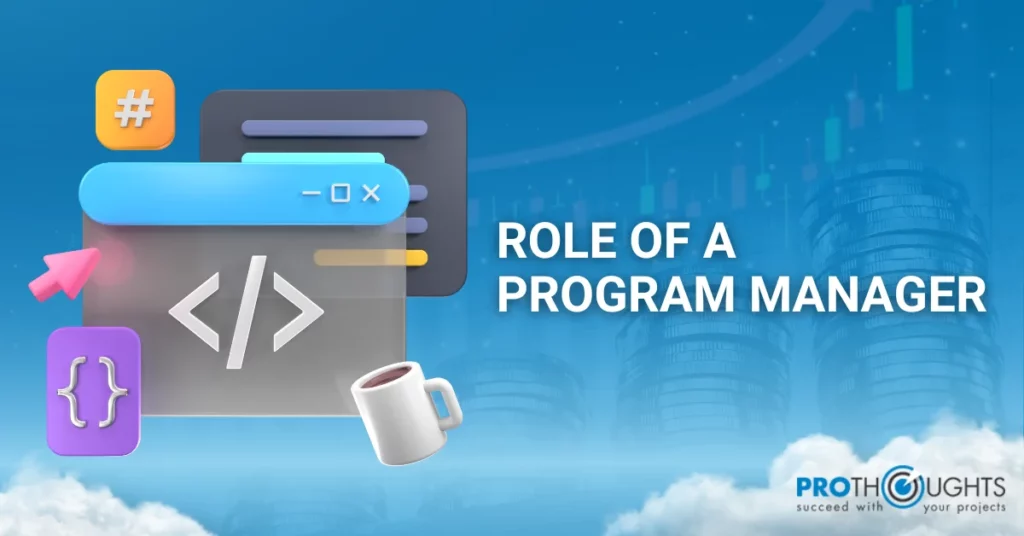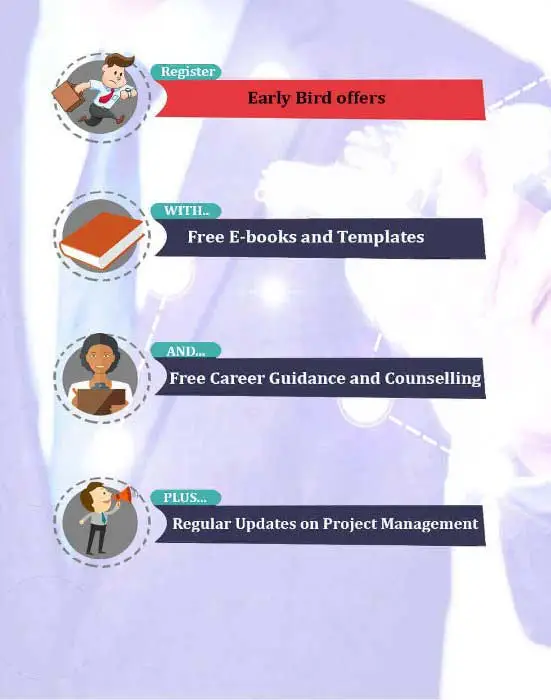 In an organization, a program manager is the strategic project management expert. They oversee multiple interrelated projects which when executed under a singular leadership, maximize business value. Some program managers handle entire programs along with their individual projects. But, in the case of large and complex programs, there are project managers who are in charge of individual projects. Whereas, there is a program manager in place who leads the project managers. Evidently, the role of a program manager involves a great deal of tactical problem-solving as well as collaboration across large teams!
In an organization, a program manager is the strategic project management expert. They oversee multiple interrelated projects which when executed under a singular leadership, maximize business value. Some program managers handle entire programs along with their individual projects. But, in the case of large and complex programs, there are project managers who are in charge of individual projects. Whereas, there is a program manager in place who leads the project managers. Evidently, the role of a program manager involves a great deal of tactical problem-solving as well as collaboration across large teams!
In this blog, we will cover what a routine day looks like in the role of a program manager. We will break down how a program manager supports the organization and the skills ideal to do it. Let’s begin by understanding what exactly is a program and how program managers handle it.
What Is A Program?
A program is a set of interconnected projects or a mix of projects and programs designed to achieve strategic business goals. For example, these goals might involve launching a product or implementing a new sales process. Since a program consists of multiple projects, each project under its scope is overseen by a project manager. Whereas, the program as a whole is led by a program manager.
Related Blog: Program Management vs Project Management
What Is The Role Of A Program Manager?
The role of a program manager involves 2 things: 1. To gain an all-inclusive perspective of the program and 2. To provide strategic guidance to project managers. Thus, program managers ensure that the teams collectively work towards achieving the program’s objective.
A program manager’s roles and responsibilities include:
- Coordinating numerous projects and addressing interdependencies between them.
- Offering strategic direction to the organization’s project managers.
- Fostering communication among the cross-functional team involved in a program.
The Vital Strategic Role of A Program Manager
Project managers concentrate on the intricacies of individual projects whereas product managers steer the strategic course of their respective products. On the other hand, program managers possess a unique strategic perspective within an organization. They have visibility into the objectives, risks, resources, budget constraints, and other critical aspects of every initiative concurrently.
By leveraging this distinctive viewpoint and insight to steer programs in the most strategically advantageous direction, program managers contribute lasting value to the company’s vision and trajectory. Any organization managing multiple projects simultaneously stands to gain from the expertise of a program manager.
Role Of A Senior Program Manager
As a senior program manager, you will lead teams across internal and external functional boundaries. You will be developing, implementing, and evaluating strategic plans, goals, and objectives. You will contribute to the production of program reports, materials, and content while overseeing program plans and tracking progress and changes. Providing and communicating the overall vision and direction for the program is essential, as is driving the strategic roadmap for product features, technology, and overall business development. Additionally, you will assist in managing and supervising program staff, ensuring the timely completion of assigned work plan objectives and projects. Seeking opportunities to improve team efficiency and processes, providing guidance and role modeling to all members, and establishing milestones while monitoring adherence to master plans and schedules are also key aspects of your role.
Role of a Technical Program Manager
Technical program managers oversee all facets of multiple technical projects within their organization, from conception to deployment, optimizing the entire release value stream. They lead project initiation, drive delivery to completion, and offer support when issues arise. TPMs negotiate scope and timelines with technical dependencies to facilitate product launches. They primarily collaborate with companies embracing modern technologies like SOA and microservices, assisting in the establishment of tools and processes for Continuous Integration and Deployment and DevOps adoption. Additionally, TPMs play a key role in addressing non-functional aspects of software delivery, including application telemetry, performance, reliability, resilience, security, and compliance.
What Does A Program Manager’s Daily Routine Look Like?
The routine duties of a program manager include:
- Conducting daily program management activities throughout the program’s lifespan.
- Establishing program governance parameters.
- Developing the overall program plan and tracking its advancement
- Supervising the program’s financial resources.
- Identifying and addressing risks and issues, implementing corrective actions as needed.
- Coordinating projects and managing their interdependencies.
- Efficiently utilizing and managing resources across various projects.
- Facilitating communication with stakeholders.
- Ensuring project deliverables align with the program’s intended outcomes.
- Maintaining and organizing key program documentation.
How Do Program Managers Support Other Members Within The Organization?
Program managers lead various teams throughout the organization. Thus, program managers offer the team strategic insights that may not be apparent when they are solely focused on individual projects.
Let’s briefly look at how program managers support different team members below:
-
Helping Product Managers
Program managers are able to assist product managers by establishing achievable objectives during the product development phase. They offer insight into the wider organizational framework of development resources. Additionally, should a development team finish a project ahead of schedule or recruit more staff than initially projected, program managers can inform product managers of potential additional resources to expedite product development.
-
Helping Developers
Given their comprehensive perspective across the organization, program managers oversee the requirements and advancement of all strategic endeavors, not just individual ones. Consequently, they can prevent the development team from being overwhelmed with tasks or assigned impractical deadlines.
-
Program Managers Aid Individuals and Teams Involved In A Program In Making Informed Decisions
Program managers prioritize strategic considerations of “How?” and “When?” to enhance decision-making across interconnected projects. This distinction highlights how program managers and product managers can collaborate synergistically, providing programs with a strategic edge.
-
A Communication Channel for Cross-functional Teams
The role of a program manager entails managing all kinds of different teams. Thus, program managers can help the teams collaborate with one another by acting as a channel for communication for cross-functional teams.
What Are Some Key Characteristics of A Program Manager?
To meet the role of a program manager, the following program management skills are ideal to have:
- Adaptable: A program manager should be able to adapt to the changing priorities of the leadership, current market conditions, and new technologies.
- User-centric: A program manager keeps in mind the user persona and user needs to cater to them and deliver ideal solutions.
- Results-driven: A core role of a program manager is to drive business value. Thus, a program manager should be result-driven and should be able to motivate their teams to deliver exceptional outcomes.
- Solutions-oriented: Program managers guide a lot of projects and are one step above project managers. Therefore, they must have the skills to tackle and resolve complex issues through critical thinking and analytical skills.
- Leadership: A program manager is fundamentally a leader of leaders. So, they must be able to guide teams effectively through their excellent communication and leadership skills.
How To Transition To The Role Of A Program Manager From A Project Manager?
Program managers are usually project managers first. After gaining experience in leading projects and learning from them, they move to the program manager role. To become a program manager, the project manager should be adept at scheduling, controlling, budgeting, and monitoring results. With 100% proficiency in these routine tasks, they can ascend to leading multiple concurrent projects.
How is A PMI-PgMP CertificatIon Important for A Program Manager?
As a program manager, your projects must achieve collective benefits that surpass what could be attained by managing them independently. To achieve this, a Program management certification could help you gain these advanced skills. The PMI-PgMP certification is a widely respected credential. It is an elite certification that only a few thousand professionals across the world have achieved. The PgMP certification demonstrates your ability to handle complex initiatives and lead them to meet the set goals and therefore showcases your proficiency in Program Management.
Steps To Earn The PgMP Certification
1. Meet The Eligibility Criteria To be eligible for the PgMP Certification, you must meet the following criteria:
- Secondary degree (high school diploma, associate’s degree, or its global equivalent);
- 48 months of Project Management experience OR PMP;
- 84 months of program management experience within the last 15 years.
OR
- Four-year degree;
- 48 months of project management experience OR PMP;
- 48 months of program management experience within the last 15 years.
2. Prepare for the Exam: To ensure complete coverage of the syllabus, you will need to undergo PgMP certification training. This training is offered by one of PMI’s Authorized Training Partners. ProThoughts is the Premier ATP of PMI and has been providing PgMP training for almost a decade now. Access our array of study materials along with the esteemed Michel Thiry book that we provide to ensure success in 1 go.
3. Apply for the PgMP exam: After preparation, you need to fill in the PgMP application. The process is a bit tedious and sometimes applications undergo an additional audit too. But, you don’t have to worry about it! At ProThoughts, we give you application assistance along with tips to tackle the audit, so that your focus remains solely on the exam!
4. Undergo Panel Assessment: Program Management Professional (PgMP) certification applications include an additional step of panel review. Once PMI completes the initial review, a panel of PMI certification holders will evaluate your experience summaries to confirm your qualification.
5. Schedule Your PgMP Exam: Once your application is approved, you can complete the payment process. After payment confirmation, PMI with email you an eligibility number that you’ll use to schedule your exam appointment. You have 3 attempts in a period of one year. But, ProThoughts guarantees your success in the 1st attempt itself!
Conclusion
In conclusion, the role of a program manager is centered around strategic guidance, effective communication, and maximizing business value. They are concerned with the management of interconnected projects that deliver better results when worked under the umbrella of a single leadership. With key characteristics such as adaptability, user-centricity, and results-driven approach, program managers facilitate informed decision-making and foster collaboration across teams. With advanced certifications like PMI-PgMP, program managers can better stick to their role. Ultimately, the role of a program manager is indispensable, particularly in large organizations.
